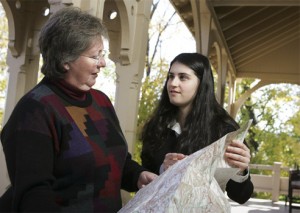Last summer, Alisandra Carnevale ’06 (Princeton, N.J.) visited the town of Pettoranello di Molise, Italy, where more than 50 years ago, her father, aunt, and grandparents left for a new life in the United States. There she listened to residents tell stories of their past and pored through books, documents, and records in the town hall and provincial library in preparation for her senior honors thesis.
A double major in history and anthropology & sociology, Carnevale is examining the role that folklore played in shaping the lives of peasants in Pettoranello di Molise during the late 19th and early 20th centuries and how that role evolved as they began to leave the town after World War II.

Alisandra Carnevale ’06 (right) is examining the role of folklore in shaping Italian peasants’ lives in an honors thesis guided by Andy Fix, professor of history, and Susan Niles, professor of anthropology (left).
Carnevale translates an example of a courtship ritual that is no longer practiced in Pettoranello, from a native speaking in the region’s dialect:
“When a boy and a girl were interested in becoming engaged, they agreed upon this on their own, without the knowledge or consent of their parents. The boy would choose a large piece of firewood (chocora, stump) and put different colors of ribbon around the wood. He would then place it at the front door of the girl’s parents’ house and then knock on the door and quickly hide in the bushes. The mother of the girl would see the wood decorated and would announce the common phrase ‘Chi è chfonata la mia figlia?’ (Who put ribbons for my daughter?). The boy would come out of the bushes and make himself known. If the mother was in accord with this relationship she would ask the boy into the house. If not, she would send him on his way.”
When Carnevale returned home from Italy, she continued her research in Princeton, N.J., collecting oral histories from immigrants and conducting research at the public library and historical society.
“I am struck by the aspects of the past that seem most crucial to those living in Pettoranello today, as opposed to those who have immigrated to Princeton,” she explains. “Those I interviewed in Pettoranello focused their attention on the deeper past whereas those who immigrated to Princeton focused their discussion on WWII stories and reasons for immigration. In this way different histories, and in turn different identities, are shaped.
Her experience has been personally rewarding as well as valuable to her academic career.
“This past summer was my fifth visit to Pettoranello, where I still have family and friends,” she says, explaining that on her third visit, during the summer before her first year at Lafayette, she had already decided she wanted to undertake a thesis on the town.
“I attended the Festa of St. Mary Assumed in the Sky,” Carnevale says. “Everything that I had been told about Pettoranello from my father and grandparents, the sense of community, deep religious belief, and folklore, was all embodied in the beautiful feast.”
Carnevale wrote a paper on the Festa of St. Mary “as an example of a symbolic statement of identity” for her Cultural Anthropology course, taught by Susan Niles, professor of anthropology. She also composed a term paper on the role of immigrant enclaves, including the enclave in Princeton where her father settled, for her Introduction to Sociology class, taught by David Shulman, associate professor of anthropology. In addition, she designed a “quipu,” or assemblage of colored, knotted cotton cords, chronicling her family’s immigration history for Niles’ Inca World course and collected, annotated, and analyzed items of Italian folklore from her father and grandmother for Niles’ Forms of Folklore class.
“I am extremely excited to be working on my thesis,” she says. “Not only does it combine many of my intellectual interests, namely folklore, Italian culture, pre-modern society, religion, and immigration studies, it also allows me to examine aspects of my heritage in a unique way. My thesis will be the first account of Pettoranello that examines the interplay of history and folklore on the lives of individuals.”
Niles and Andrew Fix, Dana Professor of History and department head, are serving as Carnvevale’s thesis advisers. Paul Barclay, assistant professor of history, and Andrea Smith, assistant professor of sociology, are serving on her thesis committee.
“All four professors are highly qualified,” she says. “Each brings a different approach to my topic, which I find invaluable. All of my advisers and committee members are excellent mentors and I am thrilled to be working with them on my thesis.”
“It has been my experience that the professors at Lafayette are truly interested in their students and helping them achieve their academic goals,” she says.
Carnevale serves as president of the History Club and Anthropology and Sociology Club and is a Student Government representative. She is also a member of Phi Beta Kappa society, the oldest and most respected undergraduate honors organization in the United States, Phi Alpha Theta (history honor society), the Concert Choir, Madrigal Singers, mock trial team, and Lafayette Activities Forum film committee.
She plans to continue her studies in law school, focusing on cultural heritage/antiquities law, criminal law, mediation, and litigation.
Honors theses are among several major programs that have made Lafayette a national leader in undergraduate research. The College sends one of the largest contingents to the National Conference on Undergraduate Research each year; 39 students were accepted to present their research at this year’s conference.
